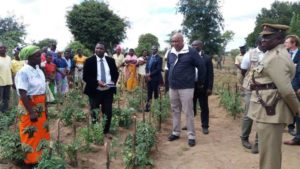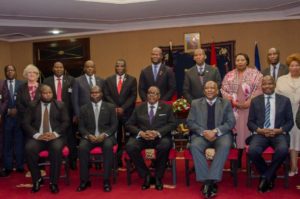King Letsie III of Lesotho: ‘Multi-stakeholder collaboration critical to ending malnutrition’
The Special Ambassador for Nutrition for the United Nations Food and Agriculture Organization (FAO), King Letsie III of the Kingdom of Lesotho, has said collaboration among various stakeholders on nutrition is critical to ending malnutrition in a country. King Letsie III said this at the…
The Special Ambassador for Nutrition for the United Nations Food and Agriculture Organization (FAO), King Letsie III of the Kingdom of Lesotho, has said collaboration among various stakeholders on nutrition is critical to ending malnutrition in a country. King Letsie III said this at the end of his four-day visit to Malawi from 18th to 21st June to advocate for enhanced efforts to end malnutrition in the country.
“One of the things that has been quite exemplary in Malawi is collaboration between various stakeholders in fighting malnutrition, including the Ministries of Health, Agriculture, Gender, UN agencies and the civil society,” said King Letsie. “We have seen that malnutrition and stunting levels have come down in Malawi and we want the levels to come down even further. I have no doubt that this partnership will accelerate this progress moving forward.”
He underscored the relevance of the Zero Hunger Strategic Review led by the Government of Malawi with participation of multiple stakeholders that is about producing policy and the recommendations end stunting and malnutrition.
“This exercise, if done properly as a broad multi-sectoral approach, will identify the bottlenecks, problems in existing programmes and how they can be overcome. Once that exercise is completed, Malawi should get a clearer picture of the situation of malnutrition and food security, and how to make improvements,” said King Letsie III.
Malawi Minister of Health, Atupele Muluzi, said, with support from the UN and other partners, Malawi has just launched a National Multi-Sectoral Nutrition Policy to provide guidance on how to intensify efforts against malnutrition. “We hope to do things differently especially on issues around behavioural change and increasing multi-sectoral collaboration in the sector of nutrition in Malawi,” said Muluzi.
#HappeningNow @FAO Special Ambassador for Nutrition, King Letsie III, visiting Mr. and Mrs Zimba’s farm in Kasungu, Malawi to appreciate integrated homestead farming initiatives being practiced there. @MalawiGovt @MalawiUNICEF @mtorresmacho pic.twitter.com/L5euJaJbnK
— FAO Malawi (@FAOMalawi) June 20, 2018
UN Resident Coordinator, Ms. Maria Jose Torres, said the UN remains committed to supporting Malawi to improve nutrition of all people, including the most vulnerable and marginalised.
“We are glad to note that during the past two decades, Malawi has lowered stunting for under-five children from 53 per cent to 37 per cent,” said Torres. “However, similar improvements are not reflected in the absolute number of children with chronic malnutrition. This calls for more public investment towards multi-sectoral programmes in nutrition to realise the objectives of improved nutrition set out in the new Malawi Growth and Development Strategy (MGDS) III through robust partnerships, including involvement of the private sector and Malawian society to build efficient foods systems.”
During the visit, Malawi President Arthur Peter Mutharika hosted, in honour of King Letsie III, a State Dinner with the Ministers of Agriculture, Irrigation and Water Development, Health, Local Government and Rural Development, and Foreign Affairs and International Cooperation. The UN was also in attendance. The State Dinner was the first engagement activity for His Majesty in Malawi .
In addition to the Government of Malawi, King Letsie III met with relevant stakeholders in nutrition, food security and agriculture, including Members of Parliament, NGOs, Development Partners, the Zero Hunger Board and the United Nations. He encouraged all actors to embrace multi-sectorial approaches in nutrition with greater coordination. The ultimate goal of His Majesty’s mission is to promote Zero Hunger as an achievable Sustainable Development Goal for Malawi, which will imply active partnership with the private sector and enhanced community involvement.
In Kasungu district, he interacted with community members and appreciated integrated homestead farming initiatives that are transforming the nutrition status of the local people.

